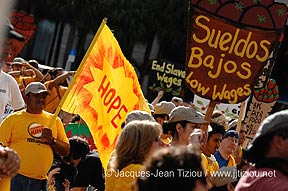Slavery in Florida’s tomato fields
(Via the Coalition of Immokalee Workers.)
The Florida Tomato Growers' Exchange is a cartel and legislative lobby which represents more than 90% of Florida's tomato growers. Over the past year or so, the F.T.G.E. has moved aggressively to discredit the Coalition of Immokalee Workers and to destroy their penny-a-pound pass-through system, through which tomato buyers can volunteer to pass along one penny per pound of tomatoes bought, which would go directly towards increasing the wages of the farmworkers who picked those tomatoes. Since these bonuses are paid directly by the tomato buyers, and not by the farm bosses, it costs nothing for the farm bosses to implement, so I’m not entirely clear what the F.T.G.E.’s interest is here — but, if I had to guess, I would suspect that the campaign is mainly just part of a larger scorched-earth campaign against the C.I.W. as such and anything that they do, for fear that widespread success here would strengthen the organization, embolden them in their campaigns against exploitative and brutal treatment by growers, raise worker’s expectations about pay and conditions, and raise their hopes about what can be accomplished by uniting together. Along the way the F.T.G.E. has teamed up with Burger King (who later broke ranks and struck a penny-per-pound deal with the C.I.W.) and with a Republican state congressman, repeatedly making unfounded insinuations that the C.I.W. was skimming graft off of the penny-per-pound system (actually, payments are held in an escrow account and audited by an independent, third-party firm), and denouncing nonviolent protest and consumer boycotts as extortion,
apparently on the claim that plantation owners have a God-given right to have their tomatoes bought, on terms set by the plantation owners and not by the buyers, and that any peep of protest or suggestion that buyers might freely choose not to buy tomatoes grown and picked under certain kinds of labor conditions is tantamount to a threat of violence. They’ve also made a special effort to spread a number of exculpatory distortions, obfuscations, half-truths, evasions, and lies about wages and conditions for tomato pickers in central Florida. For example, trumpeting the hourly wage rate that tomato-pickers can make during picking hours in the peak harvest season — about $12-$13/hour — without mentioning such minor details as the number of hours available, the unreliability of work, the fact that workers can only make that much for half the workday or so, that a few months of backbreaking work usually have to last the workers all year, and that, as that the annual income of farmworkers comes out to about $10,000/year or so, which is to say, that most farmworkers live in extreme poverty.
Then there’s the issue of working conditions, and the accusations of slavery in the tomato fields. The C.I.W. has already, several times in the past, been directly involved in busting up slave rings on Southeastern U.S. produce farms. Thus, they have focused a lot of their rhetoric on exposing the use of violence and coercion against farmworkers. But, the F.T.G.E. insists on their Industry Facts
webpage:
Myth: Farmworkers are denied their fundamental labor rights by being held and forced to work in slave-like conditions.
Facts: Florida’s tomato growers abhor and condemn slavery. Charges that growers have enslaved workers are false. On numerous occasions, the Florida Tomato Growers Exchange has asked for evidence that would substantiate allegations of slavery and have received none. The Exchange stands ready to help authorities prosecute any instance of slavery.
Meanwhile, back in the real world:
Five Immokalee residents pleaded guilty in federal court Tuesday to charges of enslaving Mexican and Guatemalan workers, brutalizing them and forcing them to work in farm fields.
The 17-count indictment in the case — one of the largest slavery prosecutions Southwest Florida has ever seen — was originally released in January. It alleged that, for two years, Cesar Navarrete and Geovanni Navarrete held more than a dozen people in boxes, trucks and shacks on the family property, chaining and beating them, forcing them to work in farm fields in Florida, North Carolina and South Carolina while keeping them in ever-increasing debt.
Chief Assistant U.S. Attorney Doug Molloy called it
slavery, plain and simple.One of the six original defendants, Jose Navarrete, pleaded guilty in May to five charges.
The two ringleaders, Cesar and Geovanni Navarrete will likely serve 12 years and face fines between $750,000 and $1 million each. Sentencing is set for December.
Although the case was set to go to trial Tuesday, the defense and the government reached plea agreements at the last minute.
In federal court, if you go to trial and lose, the sentences are extremely severe,said Geovanni Navarrete’s attorney, Joseph Viacava of Fort Myers.We were happy to negotiate a resolution that caps our client’s liability and puts him in a favorable position come sentencing.Molloy is happy too.
This is an excellent resolution,he said.The bad guys go to jail and the many victims get to go on with their lives.Plus, he said, every time there’s a slavery conviction,
We get two or three more reports of similar cases. So getting the word out about these prosecutions is extremely important,Molloy said.Members of the Coalition of Immokalee Workers, which has helped prosecute six slavery cases (including this) that freed more than 1,000 workers, also were pleased with the outcome.
The facts that have been reported in this case are beyond outrageous — workers being beaten, tied to posts, and chained and locked into trucks to prevent them from leaving their boss,said coalition member Gerardo Reyes.
How many more workers have to be held against their will before the food industry steps up to the plate and demands that this never — ever — occur again in the produce that ends up on America’s tables?— Amy Bennett Williams, Ft. Myers News-Press (2008-09-03): Five plead guilty in Immokalee slavery case
And what did the ever-helpful, standing-ready, slavery-abhorring F.T.G.E. do about all this? Not a god-damned thing. Well. That’s not entirely true. They did do something. Specifically, on November 20th of last year, while they were busy going on a high-profile press junket with Burger King to smear the C.I.W., their yellow-dog auditing agency, S.A.F.E., did stop in to visit Immokalee and issue a public statement declaring that their audits have found no slave labor
. As it happened, on the very same day that statement was issued — November 20th, 2007 — three tomato pickers reached the Collier County sheriff’s office on foot, and reported that they had just escaped out of the ventilation hatch of a box truck where they had been held against their will
by the Navarette gang. So while workers were first telling the world about the violence and enslavement they had suffered, the F.T.G.E. and its agents did go out of their way to publicly declare that all those abuses simply did not exist.
The farmworkers’ struggle is one of the most important labor struggles in the United States today, and the way that the C.I.W. is carrying it on, in the face of tremendous opposition, nasty smear campaigns, repeated threats of legal coercion, and still managing to get so much done by so many workers, for so many of their fellow workers, in a really remarkably effective bottom-up, worker-led community workers’ organization, is nothing short of heroic. And inspiring. But, well, I’m sure that all of the F.T.G.E.’s verbal abhorring and condemning of slavery is also greatly appreciated.

